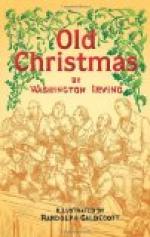Still there seemed to be a spark of almost extinguished fire, feebly glimmering in the bottom of his soul; and as the Squire hinted at a sly story of the parson and a pretty milkmaid, whom they once met on the banks of the Isis, the old gentleman made an “alphabet of faces,” which, as far as I could decipher his physiognomy, I verily believe was indicative of laughter;—indeed, I have rarely met with an old gentleman who took absolutely offence at the imputed gallantries of his youth.
I found the tide of wine and wassail fast gaining on the dry land of sober judgment. The company grew merrier and louder as their jokes grew duller. Master Simon was in as chirping a humour as a grasshopper filled with dew; his old songs grew of a warmer complexion, and he began to talk maudlin about the widow. He even gave a long song about the wooing of a widow, which he informed me he had gathered from an excellent black-letter work, entitled “Cupid’s Solicitor for Love,” containing store of good advice for bachelors, and which he promised to lend me. The first verse was to this effect:
“He that will
woo a widow must not dally,
He must make hay while
the sun doth shine;
He must not stand with
her, Shall I, Shall I?
But boldly say, Widow,
thou must be mine.”
This song inspired the fat-headed old gentleman, who made several attempts to tell a rather broad story out of Joe Miller, that was pat to the purpose; but he always stuck in the middle, everybody recollecting the latter part excepting himself. The parson, too, began to show the effects of good cheer, having gradually settled down into a doze, and his wig sitting most suspiciously on one side. Just at this juncture we were summoned to the drawing-room, and, I suspect, at the private instigation of mine host, whose joviality seemed always tempered with a proper love of decorum.
After the dinner-table was removed, the hall was given up to the younger members of the family, who, prompted to all kind of noisy mirth by the Oxonian and Master Simon, made its old walls ring with their merriment, as they played at romping games. I delight in witnessing the gambols of children, and particularly at this happy holiday-season, and could not help stealing out of the drawing-room on hearing one of their peals of laughter. I found them at the game of blind-man’s buff. Master Simon, who was the leader of their revels, and seemed on all occasions to fulfil the office of that ancient potentate, the Lord of Misrule,*




